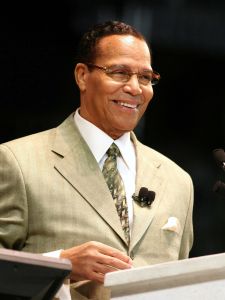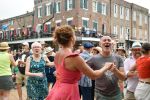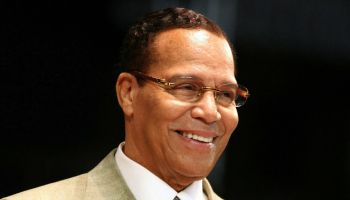
Source: Monica Morgan / Getty
Minister Louis Farrakhan was born Louis Eugene Walcott on May 11, 1933, in Roxbury, Massachusetts. After his mother recognized his artistic talent, young Louis was given a violin by his mother before his sixth birthday and began years of formal training. Later he became popularly known as “The Charmer,” and achieved fame in Boston as a vocalist, calypso singer, dancer, and violinist, but in 1955 after hearing the Honorable Elijah Muhammad speak he joined the Nation of Islam and gave up his career as a musician. By the late ’70s Farrakhan was leading the organization. One of his greatest accomplishments to date has been organizing the Million Man March in Washington in 1995.
MINISTER LOUIS FARRAKHAN TRIVIA:
- Raised by his mother, who was from St. Kitts.
- Played with the Boston College Orchestra and the Boston Civic Symphony at the age of 13.
- Won the Ted Mack Amateur Hour at age 14. He was also one of the first blacks to appear on the popular show.
- Graduating from high school at age 16, he earned an athletic scholarship for his prowess as a track sprinter and attended Winston-Salem Teachers’ College in North Carolina, excelling in the study of English.
- Introduced the POWER concept and in 1986 introduced a line of personal care products and a program for black economic development.
- Developed The Final Call in 1979, an internationally circulated newspaper that follows in the line of The Muhammad Speaks.
- Married his childhood sweetheart in September 1953, fathered nine children, and has 23 grandchildren and 4 great-grandchildren
MINISTER LOUIS FARRAKHAN’S QUOTES:
- On being gifted: “We are all gifted, but we have to discover the gift, uncover the gift, nurture and develop the gift and use it for the Glory of God and for the liberation struggle of our people.”
- On white people: “White people are potential humans – they haven’t evolved yet.”
- On justice: “There really can be no peace without justice. There can be no justice without truth. And there can be no truth, unless someone rises up to tell you the truth.”
- On growth: “I am not the same man I was 35 years ago. And I hope that five years and ten years from now, I’ll be a better man, a more mature man, a wiser man, a more humble man and a more spirited man to serve the good of my people and the good of humanity.”
- On black leadership: “Black leadership has to recognize that principles more than speech, character more than a claim, is greater in advancing the cause of our liberation than what has transpired thus far.”














